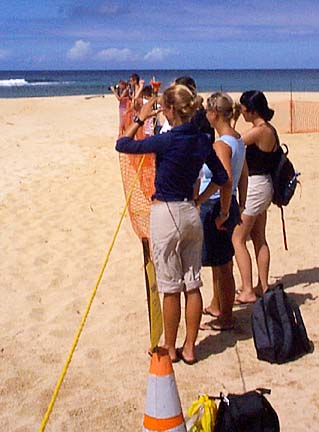


Growing pains POIPU, Kauai >> "Why can't we play here?" 5-year-old Jonathan Benedetti asked his father, Mike, of San Jose, Calif.
As a monk seal pup occupies a
popular Kauai beach, tourists are
turned away, and a feud simmers
between camps of volunteersBy Anthony Sommer
tsommer@starbulletin.comJonathan was perched on his father's shoulder at Poipu County Beach Park watching a female monk seal and her month-old pup frolicking only a few yards away.
"Because the seals are playing here," Benedetti said.
The Benedettis were carrying snorkel gear.
The rocks off Poipu County Beach Park form the best snorkeling site on Kauai.
The small bay was named the "Best Beach in the World" this year by Dr. Beach, the pseudonym for a meteorologist who annually rates the top beaches. But the "Best Beach in the World" has been closed for four weeks and likely will stay so for about two more weeks until the pup is weaned and leaves.
Public access to the water is blocked by a rope and signs stating the beach is closed because of the monk seals.
The mother monk seal that gave birth a month ago at Poipu Beach has been barking, lunging and even biting at anyone who swims near her pup.
"There's been some bitching going on, but the whole beach had to be closed," said Lucille Verrill, a volunteer seal-watcher from Poipu.
Surfers are still allowed off the Waiohai Resort but must enter and depart far down the beach. Snorkelers are being sent to Koloa Landing, another good (but not as good) snorkeling spot at the far west end of Poipu.
A small civil war has broken out among the volunteer seal-watchers, who have divided themselves into two camps allied with different government agencies. Each has about two dozen members, and each claims the seals as its own.
One group is the original volunteer Kauai Monk Seal Watch Team, formed in 1992 under the auspices of the state Department of Land and Natural Resources.
Last year, the Seal Watch Team, with support from DLNR, monitored the same mother and her pup from its birth until it was weaned.
The other group, the Hawaiian Monk Seal Coalition, split off from the Seal Watch Team this year and allied itself with the federal National Marine Fisheries Service (the acronym NMFS is universally pronounced "nymphs"). This year, NMFS stepped in with a team of its own employees and displaced the volunteer Seal Watch Team.
When asked to monitor the seals from their tower at Poipu County Beach Park, Kauai County lifeguards insisted they were too busy.

On the surface the feud seems to center on the question of how much beach should be roped off. The mother and pup have been migrating back and forth between Poipu County Beach Park and the adjacent Waiohai Resort Beach. The two beaches are divided by a large sand spit.But there also is a power struggle, some personality conflicts and hurt feelings.
The Seal Watch Team and DLNR marine biologist Don Heacock argued the only portion where swimmers needed to be banned was whichever side of the sand spit the seals were on at any given time.
Margaret Dupree, who monitors all endangered species for NMFS in the Pacific, insisted both beaches should be closed and NMFS observers would be the only "official" seal-watchers.
"The federal Endangered Species Act supersedes all other laws, so, of course, Big Brother took over. But in the process they've just about destroyed the Seal Watch Team," said Heacock.
Heacock and the Seal Watch Team had a run-in with Dupree last year when the pup, born a year ago at Poipu, later came ashore at nearby Mahaulepu Beach with a large fishhook in its mouth. Heacock, several Seal Watch volunteers and a tourist went to the rescue and removed the hook. Dupree reprimanded them rather than sending a letter of commendation they thought they deserved.
Dupree is on vacation for much of the month of August. NMFS spokeswoman Delores Clark was fully aware of the feud, however.
"We're not perceiving this as a problem," she said.
The new Hawaiian Monk Seal Coalition is headed by Char Freeman, who is lavish in her praise of NMFS.
"We work wonderfully with NMFS," she said. "They are fantastic."
Kauai marine biologist Carl Berg, an officer with the Seal Watch Team, said the problem is deeper than the personality conflicts and turf claims involved in the tug-of-war over the two seals.
"This is a statewide problem," Berg said. "If a marine mammal becomes stranded, no one has the authority to deal with it in a timely fashion."
Ultimately, NMFS has the jurisdiction over threatened marine mammals, but NMFS has no staff or equipment permanently stationed in many areas of the state. The Coast Guard, Navy, DLNR and counties all have boats and helicopters but no authority.
"Most coastal states, like California, have memorandums of understanding between federal, state and local agencies and with volunteer groups so everyone clearly knows what their roles and responsibilities are," Berg said.
"In Hawaii we have a list of phone numbers to call if anyone sights a stranded marine mammal, but that's about it."
Meanwhile, Eileen Benedetti, Jonathan's mother, was irritated.
"The whole reason we came here to Kauai was this beach," she said.
Like many regular visitors, the Benedettis remembered that a year ago, the same seal gave birth in the same area, and only a small portion of the beach was closed. This year, the entire Beach Park-Waiohai Resort area has been roped.
But like many of the tourists, three visitors from Switzerland -- Anina Fleischmann, Simone Schiesser and Melanie Ramp -- came to swim and ended up spending the morning happily watching the seals. The mother and pup obliged by swimming right up to them and posing for photographs.
"We were a little disappointed we couldn't go in the water," said Ramp.
"But the seals are very special," said Fleischmann. "This really is a treat."